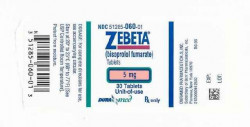Zebeta (bisoprolol) Coupons, Discounts & Cost
Zebeta (bisoprolol) is a drug used to treat cardiovascular diseases. One way to save money on the Zebeta retail cost regardless of income and insurance status is to use Zebeta coupons or discount cards from RXCoupons. Use this Bisoprolol coupon at this online pharmacy and receive up to 75% off the sale price.
What should you know about Bisoprolol?
Bisoprolol is a drug used to treat cardiovascular diseases. Bisoprolol has antianginal and anti-ischemic properties. The active ingredient of the drug is bisoprolol fumarate. The agent helps reduce heart rate, lower blood pressure and improve blood circulation. Bisoprolol can stop the rhythm problem (tachycardia).
Bisoprolol indications
Bisoprolol is prescribed for hypertension, angina, cardiac ischemia, myocardial infarction, chronic heart failure. The drug is also effective in case of sinus tachycardia, supraventricular and ventricular arrhythmias, hyperthyroidism.
Bisoprolol contraindications
Bisoprolol contraindications: hypersensitivity to bisoprolol fumarate, second- and third-degree AV block, cardiogenic shock, sick sinus syndrome, bradycardia, severe sinoatrial block, hypotension, Raynaud's disease, severe peripheral circulatory disorders, obstructive lung diseases (including asthma), pheochromocytoma, psoriasis.
Bisoprolol should not be combined with monoamine oxidase inhibitors.
The drug is not used in children under the age of 18 years, as well as during pregnancy and lactation.
Caution is needed in the following diseases: diabetes, metabolic acidosis, thyrotoxicosis, vasospastic angina pectoris, first-degree AV block.
In case of surgical treatment, patients should stop taking the drug at least 48 hours prior to the general anesthesia.
How to use Bisoprolol
It is recommended to take Bisoprolol tablets in the morning, regardless of the meal. The tablets should be swallowed whole without chewing, with a full glass of water. The dose is determined individually for each patient.
Stable angina and hypertension: patients should begin with 2.5-5 mg per day, and then gradually increase to 5-10 mg. The daily dose should not exceed 20 mg.
Chronic heart failure: Bisoprolol is allowed only in stabilized patients. During the first week, these patients should take 1.25 mg 1 time per day. During the second week, the drug is given at a dose of 2.5 mg per day. During the third week, the drug is given at a dose of 3.75 mg, and then - 5 -7 mg (4-12 weeks). After the twelfth week the daily dose of Bisoprolol is 10 mg.
The maximum daily dose is 20 mg; however, patients with severe hepatic impairment and renal impairment should not take more than 10 mg per day. Bisoprolol should be discontinued slowly (gradually reduce the dose).
Bisoprolol unwanted side effects
The potential side effects of Bisoprolol include: depression, sleep disturbances, headache, dizziness, hallucinations, conjunctivitis, blurred vision, bradycardia, orthostatic hypotension, conduction disorders, nasal congestion, bronchospasm, shortness of breath, abdominal pain, vomiting, nausea, constipation, diarrhea, muscle weakness, polyarthritis, skin rash, redness, itching, excessive sweating, tinnitus, hair loss, short-term memory loss, weight gain.
Bisoprolol important information
Bisoprolol is used with caution in psoriasis, diabetes mellitus (stage of decompensation), allergic reactions, pheochromocytoma. The drug should be taken with caution in patients whose work is connected with high concentration of attention.
It is not recommended to use these drugs in combination with bisoprolol: - Antiarrhythmics, such as phenytoin and quinidine (they may decrease the ability of the heart to contract); - Calcium channel blockers, such as verapamil (may decrease myocardial contractility); - Antihypertensive drugs, such as moxonidine and rilmenidine.
Bisoprolol can be used with restrictions: - With certain antiarrhythmics, such as amiodarone; - With parasympathomimetics (high risk of bradycardia); - With some agonists, such as isoprenaline and dobutamine; - With allergens used for immunotherapy (high risk of systemic allergic reactions); - With iodinated contrast agents (high risk of anaphylactic reactions).
Consult with your doctor if you have questions about the medications you are taking with Bisoprolol.

